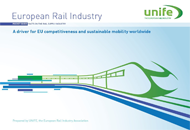UNIFE TOP MANAGEMENT ADDRESSES INDUSTRY’S PRIORITIES TO THE CHAIRMAN OF THE EU TRANSPORT COUNCIL
“The European rail industry is at a turning point of its history. Whilst European companies have built up a global presence, they increasingly face competition from suppliers from other countries. At the same time, the EU transport sector faces considerable challenges, as highlighted in the recently-published Transport White Paper. Whilst rail can make transport more sustainable, the sector clearly needs to improve its capacity to absorb bigger shares of traffic, develop its attractiveness and become more dependable.” stated CEO of Ansaldo STS Sergio De Luca, on behalf of the UNIFE Presiding Board.
SHIFT²RAIL, the rail industry’s joint technology initiative, is a top priority for UNIFE for the months ahead. This represents a large-scale collaborative effort of the rail sector to support the objectives of the Transport White Paper of the European Commission. As a first step, twelve of the largest European rail suppliers (Alstom, Ansaldo Breda, Ansaldo STS, Balfour Beatty, Bombardier, CAF, Faiveley, Invensys, Knorr Bremse, Talgo, Thales, Siemens, Vossloh) committed to combining research activities in order to make rail more attractive, more performing and fully interoperable across the European continent. The initiative will result in improved energy efficiency, main line capacity, lifetime of infrastructure and safety. Moreover, SHIFT²RAIL will help the industry to retain European leadership in global rail markets.
“A JTI instrument would bring the necessary confidence and visibility to our sector. The support of the Commission and of the Danish EU Presidency is of primary importance” said Philippe Citroën, UNIFE Director General.
“The current situation in the field of authorisation of rolling stock is also of great concern to the rail industry as national authorities continue to work in very different legal and regulatory environment” added Philippe Citroën. This results in unnecessary lengthy and costly processes and high difficulties to get a Europe-wide authorisation.
In the framework of the upcoming 4th Railway Package it is therefore of paramount importance that the European Railway Agency (ERA)’s powers are quickly enlarged to monitoring and enforcement functions in order to remove administrative and technical barriers, whilst establishing an attractive and open rail market.
The rail industry also welcomes the revision of the Trans-European Transport Network (TEN-T) policy and the creation of the Connecting Europe Facility (CEF) as the first concrete follow-up initiatives to the publication of the Transport White Paper. UNIFE calls on the Danish Presidency of the Council of the European Union to support the implementation of TEN-T projects, thus making Member States and all other actors involved subject to the rights and obligations of the Regulation.
In particular, Mr. De Luca expressed his support for the provision for mandatory implementation of ERTMS both on the core and on the comprehensive networks, as foreseen in the European Commission’s proposal. He stated: “This is an essential step in the right direction, as full deployment of ERTMS will bring significant benefits in terms of interoperability, safety and performance.” Referring to Denmark as a best practice in terms of ERTMS deployment, Mr. De Luca welcomed the Danish government’s decision to equip the entire Danish railway network and rolling stock with ERTMS. “This is an excellent example of interoperability that should be followed by other EU Member States” he said.
The Danish Transport Minister Henrik Dam Kristensen welcomed the opportunity to meet high level representatives of the European rail industry. He stated: “I find it very positive that the European railway industry takes an active approach to address the future challenges facing the railway system. It is in our common interest that the best possible framework is in place for the future development of our railways. As President of the Transport Council it is very valuable for me to discuss these issues with the industry.”
For more information, please see the UNIFE briefing for the Danish Presidency.
About UNIFE
UNIFE represents the European Rail Industry in Brussels since 1992. The Association gathers more than 70 of Europe’s leading large and medium-sized rail supply companies active in the design, manufacture, maintenance and refurbishment of rail transport systems, subsystems and related equipment. A further one thousand suppliers of railway equipment partake in UNIFE activities through 13 national rail industry associations. UNIFE members have an 80% market share in Europe and supply more than 50% of the worldwide production of rail equipment and services.
UNIFE represents its members’ interests at the level of both European and international institutions. On the technical side, UNIFE works on the setting of interoperability standards and coordinates EU-funded research projects that aim at the technical harmonisation of railway systems. The association is one of the supporting bodies of the European Railway Agency.
UNIFE. Promote rail market growth for sustainable mobility.
For further information, please contact:
UNIFE
John Harcus
Head of Communications
221, avenue Louise, bte 11
B-1050 Brussels
Tel +32 2 643 70 80
Email john.harcus@unife.org
www.unife.org
